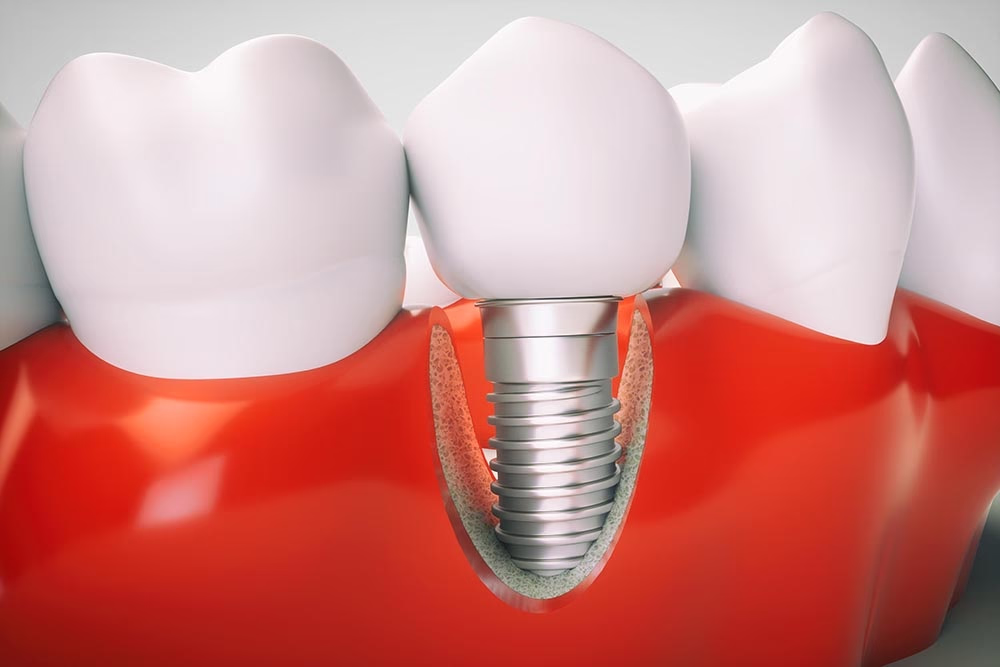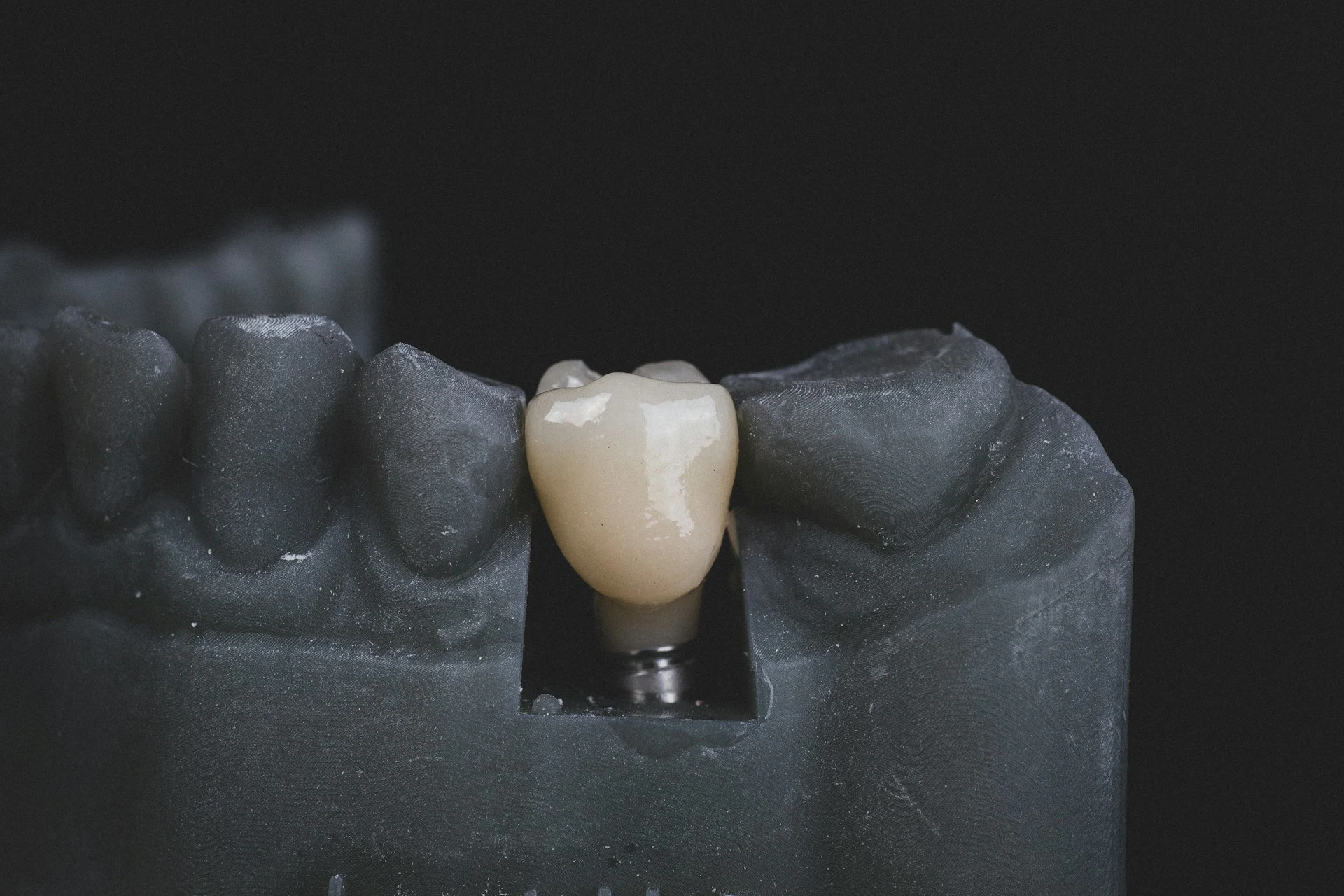Our natural teeth are crucial to our general health and enjoyment of life.
However, we must face an awful reality: if our permanent teeth are gone or damaged, they cannot recover spontaneously. Tooth loss can occur throughout our lives for a variety of reasons, including damage, accidents, gum disease, or other oral health concerns.
The good news is that current dental technology can provide fantastic options.
Thanks to substantial developments in dental treatment, we now have access to dental implants, a sophisticated type of permanent tooth replacement that has evolved greatly over the years to completely match real teeth in both shape and function.
In this article, a dental surgeon shares expert insights into everything you need to know about dental implants, from the process to recovery expectations and beyond.
What are dental implants?

Dental implants are the cutting edge of tooth replacement technology.
These specialized screws, composed of either ceramic or titanium, are surgically implanted in the jawbone to provide a solid basis for prosthetic teeth (crowns). Think of the implant as an artificial tooth root, and the crown as the visible replacement tooth.
The timeline for dental implant surgeries can vary greatly. Some patients can get new teeth in a single day using quick-loading treatments, while others may need a more traditional process that takes three to six months.
Read more: Can Dentures Replace One Missing Tooth?
Dental implants have emerged as the preferred tooth restoration method, outperforming older alternatives such as crown bridges and dentures.
Their appeal arises from their improved stability compared to dentures, which can shift during eating. Furthermore, dental implants avoid the need to modify healthy surrounding teeth, which is frequently required when using traditional bridges.
What are the different types of dental implants?
There are two types of dental implants: endosteal and subperiosteal.
1. Endosteal
Endosteal implants are the most popular option in modern dentistry. These implants are surgically implanted directly into the jawbone, and each can support one or more artificial teeth.
Their appeal arises from their ability to produce results that look, feel, and function similarly to real teeth.
2. Subperiosteal
Subperiosteal implants are an alternate treatment for patients who lack sufficient natural jawbone density but do not want to undergo bone augmentation procedures.
These implants are placed on top of the jawbone but underneath the gum tissue. While this method often has a shorter treatment duration than endosteal implants, it may not provide the same amount of long-lasting stability.
In circumstances when the jawbone structure is insufficient to sustain standard implants, dental experts can use a variety of specialized procedures to create a solid basis for prosthetic teeth. These include:
- Bone augmentation is a technique for rebuilding or strengthening the existing jawbone.
- Sinus Lift – A specific technique for adding bone material in the upper jaw.
- Ridge expansion is a procedure for widening or heightening the current jawbone structure.
It’s vital to emphasize that these preliminary steps should not cause unnecessary alarm.
Your dental surgeon will extensively examine your jaw anatomy and devise the best treatment plan for your unique needs. Open discussion with your dentist about your aims and concerns is critical to finding the best approach.
Dental Implant Material
The choice of implant material is critical to the outcome of your dental restoration. Currently, titanium and ceramic implants dominate the market. Several essential aspects should influence your decision, including cost, safety profile, comfort level, and long-term reliability.
Historically, titanium implants were the preferred option, with ceramic implants emerging as a more recent advancement in dental science.
Ceramic implants are often more expensive because of more difficult manufacturing and installation methods, but they provide specific benefits such as greater aesthetics and a more natural feel while biting.
Ceramic implants are a wonderful alternative to titanium for those who are sensitive to metals or have allergies. Furthermore, patients with autoimmune disorders such as arthritis may find ceramic implants more suitable because they eliminate the risks associated with metal implants in the body.
Titanium, in particular, might cause difficulties in situations of arthritis. As a result, many patients with autoimmune disorders choose ceramic implants to reduce the risk of unpleasant reactions associated with metallic materials.
Who Cannot Get Dental Implants?
While dental implants are an excellent alternative for tooth replacement that can improve quality of life, not everyone is a good candidate for the treatment. Before performing dental implant surgery, your dentist will thoroughly analyze various factors, including:
- Your comprehensive medical history
- Smoking patterns and frequency
- Presence of diabetes
- Dental hygiene practices
- History of osteoporosis
- Vitamin D and C insufficiency levels
The dental experts will also look for any disorders that may interfere with normal healing after the implant treatment.
Dental implants work by integrating with your jawbone to replace missing tooth roots, thus, healthy bone tissue is required for optimal insertion and healing. This is why patients with specific conditions may face additional considerations:
- People with low calcium levels
- Individuals with vitamin D deficiencies
- Individuals with low bone density
Factors That Can Affect Dental Implant Success
Regular smokers and those who struggle to maintain good oral hygiene should carefully assess their eligibility for dental implants. Implants, like natural teeth, require consistent, meticulous care, probably more so.
Without adequate maintenance, implants may fail, necessitating a second implant surgery.
Read more: Dental Implants for Teenagers
Patients with underlying health issues that affect bone health should prioritize treatment over dental implants. This strategy ensures that bone health is excellent for implant support and enhances the procedure’s long-term success.
Possible complications of dental implants
Patients are not in pain during the implant operation because of the local anesthetic.
Mild swelling and bruising are common post-procedure side effects.
Swelling usually goes away within 48 to 72 hours, but bruising can take up to two weeks to fully resolve. To alleviate discomfort during the healing process, your dentist may prescribe aspirin or other pain medications.
Some patients may encounter less usual problems, such as:
- Fatigue and lethargy
- Redness at the implant site or in the surrounding gum tissue
- A strange sensation described as an “electric shock” while touching the face
These symptoms can suggest that the body is reacting badly to metal implants. In such circumstances, patients may explore ceramic implants as an alternative.
While dental implants have high success percentages (98–99%), no medical operation comes with a 100% assurance. Immediate implant operations (when teeth are pulled and implants are inserted on the same day) have success rates ranging from 86% to 94%, indicating the more complex nature of the procedures.
Dental Implant Procedure
Proper preparation is vital for a successful dental implant procedure.
While your dentist is responsible for carrying out the treatment, patients benefit from understanding the process, including potential risks, problems, and associated costs.
Key issues to discuss with your dentist include:
- Material selection and its effects
- Cost considerations for different options
- Expected success rates for your individual instance
The Dental Implant Process
Following adequate measures before and after surgery is critical.
Your dentist will provide extensive post-operative advice to help you manage your expectations and promote proper recovery. Standard suggestions include refraining from drinking milk for the first three hours after surgery and avoiding hot beverages on the day of treatment.
Read more: A Comprehensive Guide to All-On-4 Dental Implants in Singapore
On operation day, the procedure normally follows this sequence:
- Administration of preoperative antibiotics, mouthwash, and painkillers
- Using local anesthetic to numb the treatment area
- Create a small gum incision to reveal the bone
- Examine for any bone problems
- Implant implantation and bone repair, if necessary
- Closure with stitches
Patients must refrain from eating or drinking for one hour following the operation.
Your dentist will use X-ray imaging to confirm adequate implant positioning and schedule a follow-up appointment in two weeks to check healing progress.
Most simple operations, including any necessary bone grafting, last 5 to 10 minutes, whereas more difficult instances take 20 to 30 minutes. All-on-four treatments may take longer. Minimal edema often allows for shorter surgery times and a smoother recovery.
What is the post-procedure recovery like after receiving dental implants?
The recuperation time following dental implant surgery necessitates patience and strict adherence to post-operative guidelines. Patients should rest for at least a week before returning to normal activities:
- Avoid intense physical exercise
- Avoid harsh meals throughout the recovery phase
- Follow particular care if implants are near the sinuses, such as avoiding air travel for 6 weeks
Read more: The Complete Guide to Teeth in a Day in Singapore
Recovery times vary by individual; however, patients should plan on at least 1-2 weeks for early healing.
Long-Term Care
Maintaining dental implants follows similar concepts as caring for natural teeth:
- Brush at least twice a day
- Floss everyday
- Use a Waterpik gadget for optimal cleaning, particularly in hard-to-reach locations
Regular dental examinations every 6-12 months are necessary for:
- Examining the implant condition
- Ensure proper cleanliness
- Preventing tartar buildup
- Addressing possible concerns early
Do dental implants need to be replaced?
Dental implants are generally designed to be permanent solutions that do not need to be replaced if properly maintained. However, difficulties may arise:
- Some people could develop peri-implantitis (inflammation)
- In certain circumstances, implant salvage treatments may be essential
- The method entails removing the crown and doing a thorough cleaning
- Bone grafting surrounding the implant can be required
If salvage attempts fail, the implant may have to be removed and replaced. Trauma or accidents involving the implant necessitate a professional evaluation to determine whether salvage is feasible or a replacement implant is required.
Do dental implants actually go into the bone?
Yes! The purpose of dental implants is to insert titanium screws into the bone. These titanium screws have been surface treated to improve their ability to adhere to the bone.
This titanium screw contains another screw system that allows an artificial crown to be tightened into the fixture. And voilà! You’ve now got a bionic tooth!
Do dental implants surgery hurt?
The dental implant surgery is not painful at all.
However, when local anesthetic or an injection is administered, it may sting slightly. Even it doesn’t hurt much because we apply a lot of numbing cream before administering the shot. We also utilize a tiny gauge needle, so you don’t feel the local anesthesia being administered.
After the implant operation, you may experience some soreness as the local anesthetic wears off. So, before the anesthetic wears off, take some painkillers to avoid being in discomfort post-operatively!
Does it trigger metal detectors at the airport?
No. Dental implants are constructed of titanium, which is less dense than other metals. So it won’t trigger airport security scanners. Don’t worry!
Can I still have MRIs and CT scans after the dental implant?
Yes, absolutely! All dental implants and their components are made from non-ferromagnetic metals and alloys, in accordance with approved requirements.
All MRI studies on patients with implants are thus completely safe. CT scans are also safe.
How long will the dental implant last?
When a dental implant is fully integrated into the body, it is expected to last a lifetime. However, there are several ways to lose a dental implant, the most common of which being gum disease.
An implant, like a normal tooth, can lose bone along its periphery. When bone is lost, the implant might become loose and fall out, just like natural teeth.
So, even after your implants have been placed, it is critical to visit your dentist on a regular basis. He or she can assist prevent gum disease from developing around your natural teeth and implants.
My sister’s/friend’s/father’s dental implant fell out. Will mine also drop out?
The success rate of most superior dental implants is between 90 and 95 percent. If you’re in good health, your implant should seamlessly fuse with your bone.
Typically, when implants fail, other systemic variables are involved. The person may have undiagnosed or uncontrolled diabetes, be a smoker, or have weakened immunity. Consult your dentist to analyze your risk factors!
According to my friend, his acquaintance informed him that his friend died as a result of dental implants. Will that happen to me, too?
We’ve all heard horror stories from the emergency department, but dental implants are normally a relatively safe surgery when performed by a qualified professional.
Your dentist will do a thorough examination, including:
- Clinical observations
- X-rays
- CT scans if necessary
This ensures that no essential blood vessels or nerves are encroached upon during surgery.
And if you want proof of your dentist’s credentials or experience, simply ask. They should have diplomas or credentials ready to show you! When my patients inquire about the number of dental implants I have placed before theirs, I always appreciate their direct response.
What are the alternatives to dental implants?
The alternatives to dental implants include:
- Wearing removable dentures
- Dental bridge linked to surrounding teeth.
Consult with your dentist or dental practitioner to determine which choice is best for you.
What is the cost of dental implants in Singapore?
The cost of dental implants in Singapore varies greatly, ranging from $2,200 to $8,000. These expenses differ depending on several factors:
- The materials utilized
- A specific implant system was chosen
- The surgical procedure required is complex
For example, a front tooth replacement requiring both bone and gum grafting and using a high-aesthetic ceramic implant normally costs between $7,000 and $8,000.
Related article: A Dentist Explains Dental Implant Costs in Singapore
This emphasizes the significance of discussing various treatment plans, material options, and associated expenses with your dentist to discover the best answer for your needs.
Financial Assistance Options:
At numerous dental clinics in Singapore, various procedures are eligible for Medisave claims, including:
- Implant surgery
- Wisdom tooth surgery or extraction
- Bone Grafting Procedures
- Cyst Removal
- Biopsies
Family members’ Medisave accounts provide additional financial flexibility. If a patient’s personal Medisave resources are insufficient, they may use Medisave savings from immediate family members, subject to claim restrictions set by Medisave guidelines.
Summary
The basic goal of dental implant therapy is twofold:
- Ensure long-term implant success
- Improving the patient’s overall quality of life after the treatment
It is critical to recognize that there is no one-size-fits-all “best” implant procedure. Rather, success depends on:
- Finding the technique that best fits your individual needs
- Working with a professional dentist who can conduct the treatment without problems
- Choose a dental practitioner who makes you feel comfortable and actually understands your goals
The key to effective dental implant therapy is careful planning, expert execution, and adequate maintenance. Understanding your options and working closely with your selected dental professional can help you get optimal outcomes that improve your oral health and quality of life.
Remember that frequent maintenance, appropriate care, and following your dentist’s recommendations are critical to ensuring that your dental implants last for many years. While dental implants require a large investment, they can provide a lifetime of advantages if properly maintained and cared for.
This holistic approach to dental implant therapy, along with current techniques and materials, provides patients with a dependable, long-lasting tooth replacement option that is functionally and aesthetically similar to real teeth.

